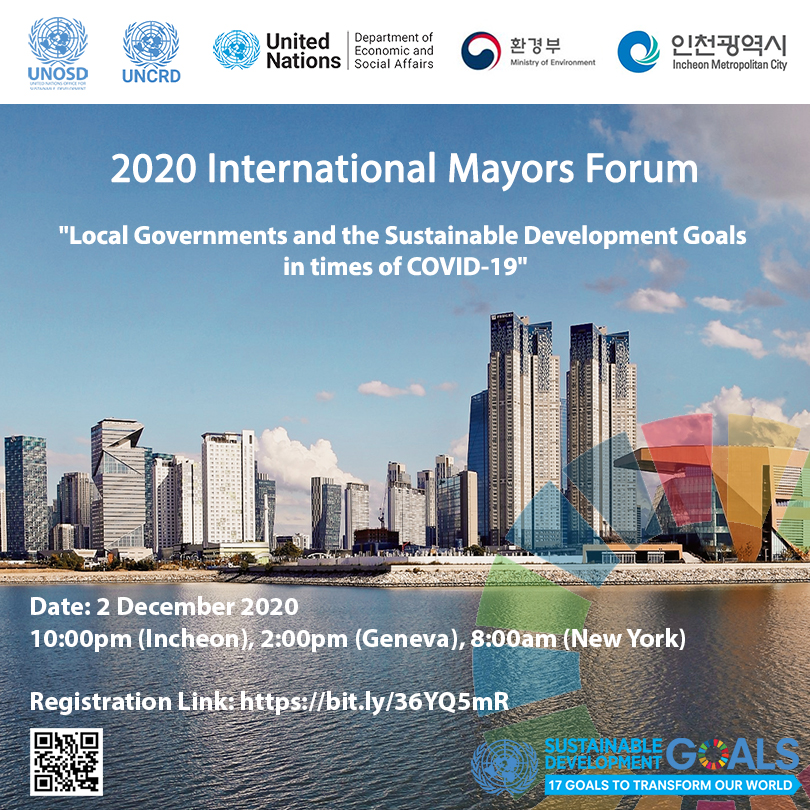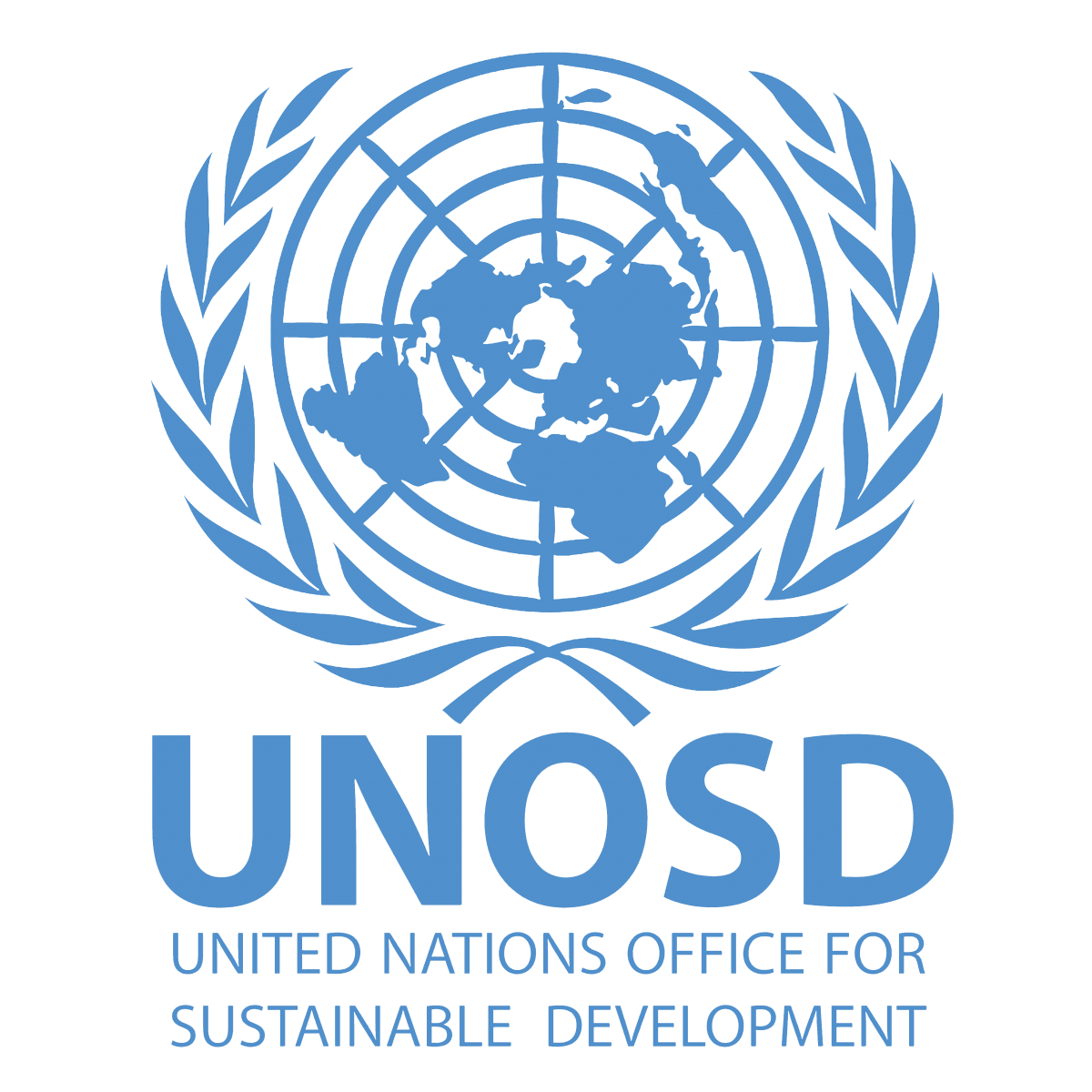[2020] International Mayors Forum "Local Governments and the Sustainable Development Goals in times of COVID-19"

Documents
CONCEPT NOTE (updated as of 1 December 2020)
SPEAKER BIOGRAPHY (updated as of 3 December 2020)
Recording of the Webinar
2020 International Mayors Forum
Background
As they accommodate more than half of the global population today and that this percentage is projected to reach 60 per cent by 2030 at the current rate of urbanization, and as they contribute to 60 per cent of global GDP, cities and metropolitan areas are incontestably intimately linked to sustainable development. As a matter of fact, they are also expected to play a key role in accelerating the achievement of the 2030 Agenda, as they lay at the heart of the three levels of the Decade of Action ━ a call by the UN Secretary General for all sectors of society to mobilize themselves for the accelerated delivery of the Global Goals.
Local governments have a critical role in providing access to basic services in normal times and ensuring that these public services are uninterrupted in times of adversity, while also acting as frontline responders in crisis response, recovery and rebuilding. The unprecedented COVID-19 pandemic has exposed and exacerbated many of the challenges local authorities are facing in keeping with these responsibilities with an estimated 90 per cent of all reported COVID-19 cases taking place in urban areas, where all sectors have been deeply impacted. Local governments are also facing additional challenges to the one of restoring life as normal as they must also doubling their efforts to accelerate progress on the SDGs as well as achieving recovery and building resilience of their communities in the short and the long run.
The current trend of urbanization is often accompanied by significant social and environmental challenges, such as the lack of access to adequate, affordable urban land and housing options, urban infrastructure and basic services for a growing number of citizens, who suffer from rising inequality and exclusion, unemployment, food insecurity and extreme poverty. This is particularly true in developing countries, where 95% of urban expansion will take place over the next decades.
Unsustainable patterns of consumption and production are found to a large extent in cities, which are also main contributors to climate change and environmental degradation. While accommodating more than half of the world’s population on only 2 to 3 per cent of the earth’s land, the world’s cities nonetheless account for 60-80 per cent of global energy consumption and generate as much as 75 per cent of the energy-related greenhouse gas (GHG) emissions.
Rapid urbanization is exacerbating the environmental impact of cities exerting pressure on fresh water supplies, sewage, the living environment, and public health. Figures from 2016 showed that air pollution was affecting 90 per cent of urban dwellers, causing 4.2 million deaths. Cities are also rapidly becoming more vulnerable to weather- and climate-related extreme events, which are increasing in frequency and severity with climate change.
Local governments can play a central role in addressing the social and environmental challenges taking place in urban areas and ensuring a swift and sustainable recovery from the impact of the COVID-19 pandemic as well as restoring and accelerating progress in delivering the Sustainable Development Goals as far as we urgently empower them to do so. The UN Secretary-General has underscored that local governments have already been taking action to recover better from the pandemic, but he also emphasized that more must be done to strengthen the capacities of local governments for a "green, inclusive and resilient economic recovery that will transform cities and address the climate and pollution crises".
The climate crisis is occurring in tandem with global mega-trends marking the unsustainability of cities in the current business as usual scenario. Local governments are currently facing multiple hazards and risks – including from the COVID-19 pandemic complex impacts. These mega-trends include a rapidly growing urban population, declining biodiversity, resource depletion, environmental degradation, and the unpredictability of climate-related disasters, to name a few.
In September 2019, during the UN Secretary-General’s SDG Summit, Heads of State agreed on a Political Declaration (A/RES/74/4) for the coming Decade of Action, committing to “Bolstering local action to accelerate implementation”. The Political Declaration also commits Member States to “empower and support cities, local authorities and communities in pursuing the 2030 Agenda” given the central role of cities in accelerating progress for the SDGs.
In this vein, UNOSD is convening mayors and local leaders and stakeholders to take part in this special webinar of the 2020 International Mayors Forum to discuss strategies and measures to enhance local governments’ knowledge and skills around a series of essential topics to build back better in the COVID-19 response, while also accelerating progress for the 2030 Agenda.
Objectives
The general objective of the International Mayors Forum is to provide a platform for policy dialogue and knowledge sharing through presentations and discussions on key aspects related to the implementation of the Sustainable Development Goals — particularly Goal 11 — at local level as a means to achieve a better understanding of successes, lessons and specific mechanisms and accelerate the in-depth transformation needed to make our societies inclusive, safe, resilient and sustainable.
More specifically and given the current context of the COVID-19 pandemic, the 2020 International Mayors Forum aims to examine the social, economic and environmental impacts of the current crisis on cities and local governments and identify potential solutions for sustainable responses. It also aims to provide local governments and local actors with knowledge in support of a swift recovery from COVID-19 and advancing the decade of action and delivery for sustainable development.
This special webinar is part of the 2020 International Mayors Forum, which this year has been exceptionally taking place through a series of virtual meetings (2020 International Mayors Forum preparatory webinar series) examining environmental and socio-economic strategies and measures that are being and/or can be implemented by local governments to accelerate COVID-19 recovery as well as the delivery Sustainable Development Goals by 2030. In accordance with the policy brief launched by the UN Secretary-General on COVID-19 in an Urban World, the 2020 International Mayors Forum focuses on strengthening the capacities of local governments for a "green, resilient and inclusive economic recovery… steer growth towards a low-carbon, resilient pathway and advance the Sustainable Development Goals… (and) building more resilient, inclusive and sustainable cities."
Unlike the previous editions of the UNOSD-led International Mayors Forum held in person on several (4-5) days, this year’s Forum is taking place virtually due to the current COVID-19 pandemic. The 2-hour online meeting will discuss the salient points of the recently held webinar series exploring key themes and actions for a swift recovery from COVID-19 impact and ensure the fast delivery of the SDGs by 2030. It will also present some of the additional webinars and capacity building activities that UNOSD will be organizing over the coming weeks and months to support local governments in their recovery and development actions, as an extension of the 2020 International Mayors Forum. Experts and representatives of the United Nations, national and subnational governments and civil society organizations will also discuss initiatives and programmes in place in different parts of the world, which are supporting rapid and sustainable recovery from the current crises and SDG delivery at local level. The speakers (as well as the audience) will also be asked to share their reflections on local governments’ needs for capacity development, to which UNOSD and its partners could potentially respond through its capacity development activities, such as the Mayors Forum in the future.
Organizers

This webinar is organized by the United Nations Office for Sustainable Development (UNOSD) of the United Nations Department of Economic and Social Affairs (UN DESA).
Target Audience
This Forum aims to engage mayors and other sub-national government leaders and representatives, and national institutions concerned with SDG implementation at local level across the UN Member States. The Forum will also be open to non-government experts working in the areas of national to local SDG implementation. It will also welcome academia, youth, and other interested stakeholders to ensure an inclusive and integrated discussion on accelerated local solutions for the SDGs and the 2030 Agenda.
Speakers
- Moderator - Mr. Jean D'Aragon, Senior Sustainable Development Expert, UN Office for Sustainable Devbelopment (UNOSD)
- Opening Remarks - Mr. Chun Kyoo Park, Head, UN Office for Sustainable Devbelopment (UNOSD)
- Congratulatory Remarks - H.E. Mr. Myung-Rae Cho, Minister, Ministry of Environment of the Republic of Korea
- Wecolming Remarks - Hon. Mr. Namchoon Park, Mayor of the Incheon Metropolitan City
- Guest Keynote - Mr. Amson Sibanda, Chief, National Strategies and Capacity Building Branch, Division for Sustainable Development Goals, UN DESA
Presenters
- Ms. Riina Jusslia, Sustainable Development Officer, UN DESA
- Mr. Jean Pierre Elong Mbassi, Secretary General, United Cities and Local Governments – Africa (UCLG-Africa)
- Theme: Making African cities inclusive, safe, resilient and sustainable
- Ms. Bernadia Irawati Tjandradewi, Secretary General, United Cities and Local Governments Asia-Pacific (UCLG-ASPAC)
- Ms. Jorgelina Hardoy, Coordinator and Senior Researcher, Instituto Internacional de Medio Ambiente y Desarrollo – America Latina (IIED – AL)
- Mr. Sangyoung Park, Principal Researcher, Korea-Mekong Water Management Collaboration Research Centre, K-Water
- Mr. Kazushige Endo, Director, United Nations Centre for Regional Development (UNCRD)
- Ms. Caroline Lombardo, Chief, International Tax and Development Cooperation Branch
- Mr. Daniel Platz, Economic Affairs Officer, Financing for Sustainable Development Office, UN DESA
Links to 2020 International Mayors Forum Webinar Series
- #1. "Accelerating Decent Work and Economic Growth for a Resilient Urban Recovery in the Era of COVID-19" - 17 September 2020 (KST)
- #2. "Local Governments, the Climate Crisis, and a Green Recovery from COVID-19" - 24 September 2020 (KST)
- #3. "Delivering Basic Services to Leave No One Behind - Closing the WASH Gap" - 8 October 2020 (KST)
- #4. "Leaving No One Behind - Gender Equality and Women's Empowerment in our Cities and Communities" - 15 October 2020 (KST)
- #5. "Impact Investment in Cities - Innovations to Finance the 2030 Agenda Locally" - 22 October 2020 (KST)
- #6. "Leaving No One Behind - Persons with Disabilities and Addressing Inequalities in our Cities and Communities" - 29 October 2020 (KST)
Contact Information
For any questions or comments please contact Mr. Jean D’Aragon, Senior Sustainable Development Expert, UNOSD at daragon@un.org; and Ms. Sara Castro-Hallgren, Programme Management Expert, UNOSD at sara.castrohallgren@un.org
Disclaimer:
For the purpose of this event, UNOSD procures the services of Cisco Webex, an external service provider. Registration for this webinar is supported by the Webex Events registration mechanism and does not imply the expression of any opinion whatsoever on the part of the Secretariat of the United Nations concerning the legal status of any country, territory, city or area or of its authorities

